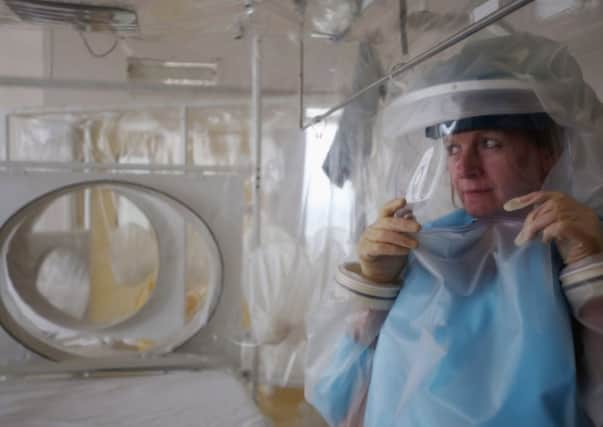British Ebola victim returns home


The man, who is not “seriously unwell”, was taken to RAF Northolt in west London after landing at 9pm.
He was then transported to the UK’s only high-level isolation unit at the Royal Free Hospital in Hampstead, London.
Advertisement
Hide AdAdvertisement
Hide AdIt is the first confirmed case of a Briton contracting the deadly virus during the recent outbreak. The identity of the patient – who lived in Sierra Leone – has not been disclosed.
There is no cure for Ebola and outbreaks have a fatality rate of up to 90 per cent.
Health chiefs insisted that the risk to the British public from Ebola is “very low”.
The infected patient’s bed will be surrounded by a specially designed tent with its own controlled ventilation system. Only trained medical staff are allowed inside the unit.
A spokesman for the Department of Health said earlier yesterday: “The patient is not currently seriously unwell and is being medically evacuated in a specially equipped C17 RAF plane to RAF Northolt in the UK.
“Upon arrival in the UK the patient will be transported to an isolation unit at the Royal Free London NHS Foundation Trust.”
Professor John Watson, deputy chief medical officer, insisted “the overall risk to the public in the UK remains very low”. He said: “We have robust, well-d
eveloped and well-tested NHS systems for managing unusual infectious diseases when they arise, supported by a wide range of experts.
Advertisement
Hide AdAdvertisement
Hide Ad“UK hospitals have a proven record of dealing with imported infectious diseases and this patient will be isolated and will receive the best care possible.” Dr Paul Cosford, director for health protection at Public Health England, said: “For Ebola to be transmitted from one person to another, contact with blood or other body fluids is needed and, as such, the risk to the general population remains very low.”
Dr Bob Winter, national clinical director for emergency preparedness and critical care for NHS England, said preparations have been made over the past few weeks to ensure any patient being repatriated to the UK receives the best possible care.
The World Health Organisation (WHO) has put the number of people infected with the deadly virus at 2,615. Some 1,427 have died since the disease was identified in Guinea in March and spread to Sierra Leone, Liberia and Nigeria.
Rigorous quarantine measures are used to stop the spread of Ebola, as well as high standards of hygiene for anyone who might come into contact with sufferers.
Symptoms of the virus appear as a sudden onset of fever, intense weakness, muscle pain, headache and sore throat. This is followed by vomiting, diarrhoea, rash, impaired kidney and liver function and, in some cases, both internal and external bleeding.